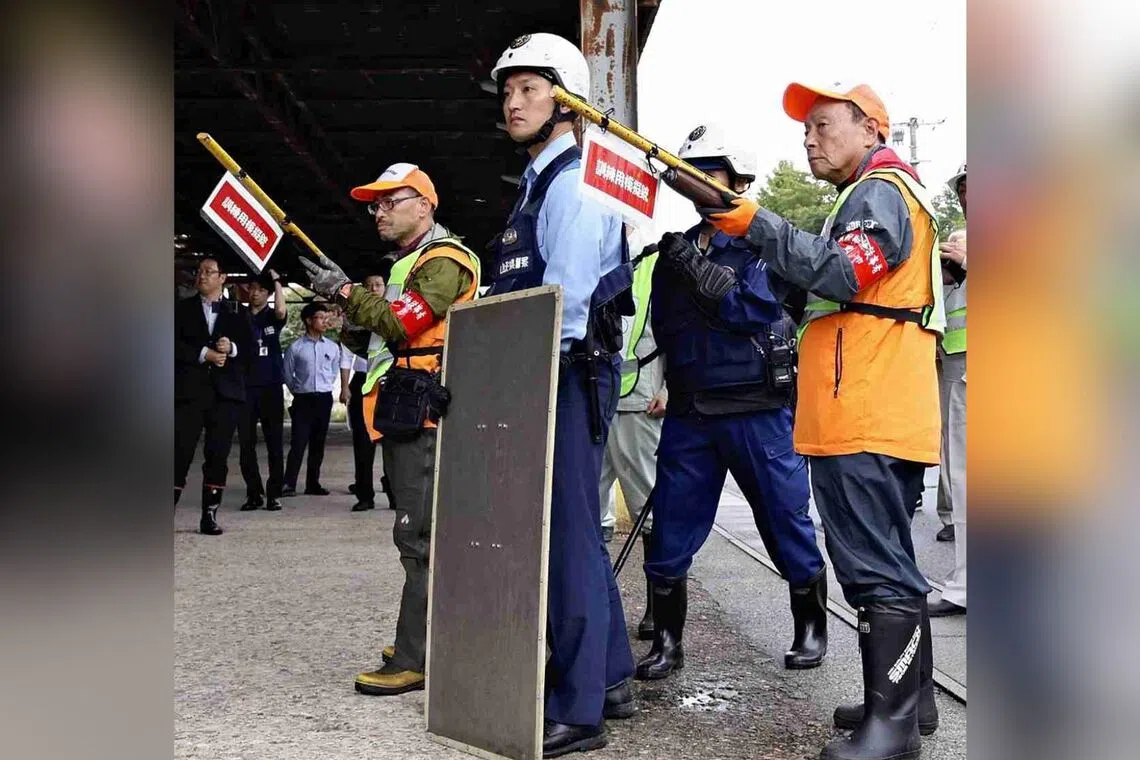Japan’s hunters bag higher pay as bear problem mounts
Sign up now: Get insights on Asia's fast-moving developments

Hunting association members and police officers train to confront bears in an "emergency hunting" programme in Tendo, Yamagata Prefecture, on Sept 25.
PHOTO: YOMIURI SHIMBUN/ASIA NEWS NETWORK
TOKYO - Municipalities in Japan are moving to increase pay for licensed hunters who capture bears, as attacks by the animals continue to rise.
The municipalities aim to improve support for members of hunting associations, who now shoulder greater responsibility after a new system was introduced allowing for the emergency use of firearms
In September, a law was revised to allow municipal governments to authorise hunters to engage in such emergency hunts.
Hunting associations have called for compensation rules and sums to be standardised, since they currently differ among municipalities.
Attacks hit record 100
Mr Ryoei Kazuno, 75, secretary-general of the Ogachi Hunting Association, captured a bear that occupied a house for six days after attacking a man in Yuzawa, Akita Prefecture, earlier in October.
“We are truly relieved that we managed to capture the bear. But it must be remembered that the burden on hunting association members will increase, as bears that have gotten larger ahead of hibernation may appear in inhabited areas,” Mr Kazuno said.
Hunting associations are private groups of licensed hunters. They operate on a branch basis at prefectural, municipal and other local levels under Dainihon Ryoyukai, a national hunters group based in Tokyo. The national group had 100,561 members as of fiscal 2024.
Association members work to capture bears using hunting rifles or traps when people are harmed or crops are damaged. They also engage in educational activities to prevent hunting accidents.
Most members have a regular job and respond to hunting requests from municipal governments.
The compensation they receive varies by municipality. Some are paid hourly wages, while others get daily allowances. In other cases, they are paid based on the number of bears captured. The amount of compensation also varies.
Since April, more than 100 people have been injured in bear attacks, marking a new record. Emergency hunts have been conducted eight times in cities like Sendai, Toyama and Sapporo.
However, firing on bears in urban areas requires advanced skills, and also involves risks for hunters. In one case, a hunter was attacked by a bear and injured.
More risk, more pay
The increased risk for hunters has fuelled a trend towards higher pay.
In July, the town of Biei in Hokkaido increased the hourly wage to 4,000 yen (S$34), up from 1,500 yen in fiscal 2024, and payment per bear captured rose to 60,000 yen, up from 20,000 yen. The town used national subsidies to cover the higher payouts.
“The compensation for capturing a brown bear, which is risky, was only 6,000 yen more than for capturing a Yezo sika deer, so we made the change,” a town official said.
In Iiyama, Nagano Prefecture, in September, a measure was approved by the city assembly to raise the daily allowance for hunting association members to 10,000 yen from 5,700 yen. This was in consideration of the risk hunters are facing, as a series of bear attacks on people have occurred in the city.
The city of Imizu, Toyama Prefecture, introduced a system earlier in 2025 to pay hunters 50,000 yen per bear captured. Although no bears have been captured in the city, a municipal official said: “Bears could appear anywhere now. We wanted to be prepared for when they do show up.”
The Shibata city government in Niigata Prefecture decided to increase the daily allowance for emergency hunts from 5,000 yen to 8,000 yen, finding that such operations could involve more risk.
Seven municipalities in Iwate Prefecture, including the cities of Kitakami and Ofunato, are considering similar measures.
Rising costs for bullets, which are often imported, and fuel are also a burden on hunters. The town of Obuse, Nagano Prefecture, is considering raising the annual allowance of 16,000 yen per hunter for bullets in the next fiscal year.
Short on funds
Meanwhile, some municipalities are struggling to raise pay.
The city of Chichibu in Saitama Prefecture commissions four local hunting associations for wildlife control. While there are calls to raise compensation to reflect hunters’ increased responsibility, a city official said: “Securing the funds will be difficult unless we, for example, end compensation for controlling damage caused by the growing number of monkeys.”
Under the emergency hunting system, the national government envisions hunting associations responding to hunting requests beyond municipal boundaries. But the reality is that compensation varies even within the same prefecture.
The town of Naie in Hokkaido raised its compensation in July 2024 only after a local hunting association declined to assist in capturing a brown bear, saying that the compensation was too meagre.
“Every hunter is risking their lives when dealing with a bear. We hope that the amount of compensation will at least be standardized at the prefectural level,” said Mr Yohei Sasaki, chairman of the national hunters’ association. THE JAPAN NEWS/ASIA NEWS NETWORK


